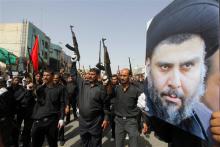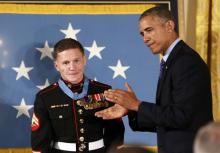Iraq War
Iraq army general killed by shelling: spokesman
Shelling west of Baghdad killed the commander of the Iraqi army's 6th division on Monday, Prime Minister Nuri al-Maliki's security spokesman said.
- Read more about Iraq army general killed by shelling: spokesman
- Log in to post comments
Iraq receives first batch of Russian jets
Iraq said it received the first batch of Sukhoi warplanes from Russia as it pressed a counter-attack June 29 against Sunni militants whose offensive threatens to tear the country apart.
- Read more about Iraq receives first batch of Russian jets
- Log in to post comments
Kerry issues warning after Syria bombs Iraq
Syrian warplanes bombed Sunni militants' positions inside Iraq, military officials confirmed Wednesday, deepening the concerns that the extremist insurgency that spans the two neighboring countries could morph into an even wider regional conflict. U.S. Secretary of State John Kerry warned against the threat and said other nations should stay out.
- Read more about Kerry issues warning after Syria bombs Iraq
- Log in to post comments
Iraq's Sadr vows to 'shake the ground' against militants
Powerful Shiite cleric Moqtada al-Sadr has vowed to "shake the ground" under the feet of advancing Sunni militants, as Iraqi prime minister Nuri al-Maliki warned rivals against exploiting the crisis to sideline him.
Mainly ethnic Turkmen town Telafer in north Iraq falls to ISIL militants: Official
The strategic mainly ethnic Turkmen town of Telafer in north of Iraq has completely fallen to Sunni Arab militants after days of heavy fighting, a local official and witnesses said on June 23.
"The town of Telafer and the airport... are completely under the control of the militants," the official said on condition of anoymity.
Kerry backs Iraq against 'existential' militant threat
U.S. Secretary of State John Kerry on June 23 pledged "intense" support for Iraq against the "existential threat" of a major militant offensive pushing toward Baghdad from the north and west.
Flying in from Jordan, Kerry met with Prime Minister Nuri al-Maliki and other Iraqi leaders to urge a speeding up of the government formation process in order to face down the insurgents.
Obama to send advisors to Iraq, open to military action
President Barack Obama pledged to take "precise" military action if needed to check marauding Sunni radicals in Iraq and offered up to 300 US advisors to train Iraqi forces facing a crisis splintering the country on sectarian lines.
Obama Could Act in Araq without US Congress Approval
US President Barack Obama could intervene in Iraq without seeking support from lawmakers, Republican Senator Mitch McConnell said after Obama met Congress members.
In his words, the President "he didn't feel he had any need for authority" to take steps on the Islamist militants' advance in Iraq, as the BBC quoted McConnell as saying.
Armageddon in the Middle East
The recent developments in Iraq have once again called the state borders of the Middle East into question. In reality, the initial signs for change came with the end of the Cold War, accelerated with the U.S. invasion of Iraq, and took a decisive turn with the extension of the Arab Spring into Syria.
- Read more about Armageddon in the Middle East
- Log in to post comments
US Military on Standby Around Iraq
US forces are ready on standby in the Gulf, as the situation in Iraq continues to deteriorate.
An aircraft carrier and five warships are already in the Persian Gulf, according to CNN. Dozens of helicopters are also prepared to patrol the area.
- Read more about US Military on Standby Around Iraq
- Log in to post comments








